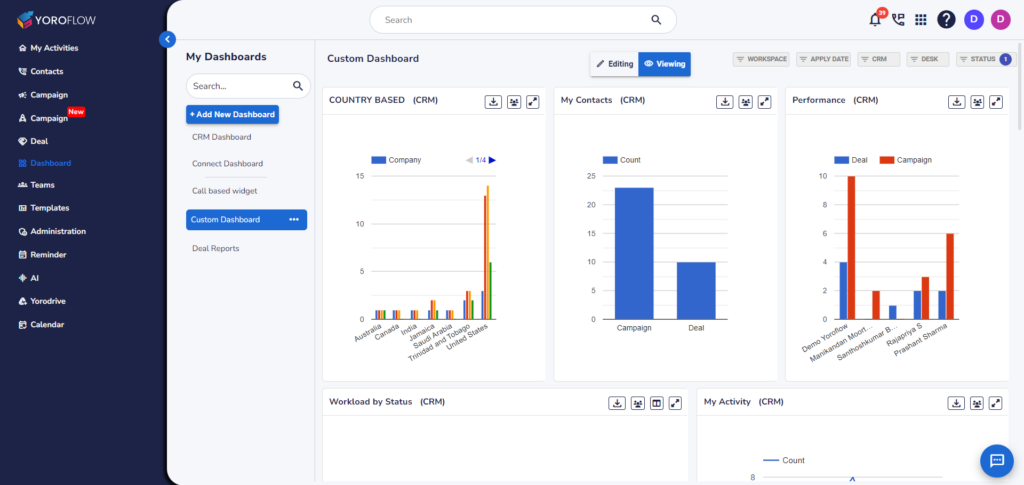Table of Contents
As the sales teams are the backbone of the company’s revenue, the company should consider rewards for the salespeople to encourage them. So that salespeople can work with enthusiasm to achieve their targets
A sales compensation plan involves planning incentives for achievements and streamlining the goal along with the company’s policy. Providing rewards will make the resources stay with the organization with a more positive approach.
This article will explore sales compensation plans, components and types of sales compensation, and tips for creating effective sales compensation plans.
What are sales compensation plans?
The sales compensation plan is the process of determining how to reward the salespeople for achieving targets. This sales compensation plan will be fixed based on various factors like how much revenue is generated, how much time is taken to close the deals, and whether the target is achieved. Sales compensation is an essential key to encouraging the sales team and achieving organizational goals
The basic sales compensation plan includes base salary, incentives, and commissions. This plan structure may vary depending on the requirements of the companies. This sales compensation plan can be customized based on the role of salesperson, designation, duration of the sales cycle, and types of sales engagement.
Various sales automation tools are there to automate the sales tracking process and calculating sales compensation plans as per the company policies. YoroCRM is a tool that automates several sales tasks like lead management, streamlining sales pipeline, tracking, and provides reports based on various factors to enhance the sales strategy.
Sales compensation components
For creating a successful sale compensation plan, the basic components like base salary, commission, and bonus should be included. Organizations should combine all these three basic components to balance their policies and terms to motivate their sales teams.
- Base salary: Employees will be comfortable in working with a fixed salary model. This will give them a monthly income to meet their commitments. Organizations should fix a competitive base salary which equates their experiences, skills, and responsibilities.
- Commission: Commission or incentive is a term used to appreciate an individual or team’s performance. This commission is not a fixed component, which may vary based on their salary or revenue they generated. It can be calculated based on the percentage of revenue, profit, or other factors.
- Bonus: Bonus can be given to the salesperson for extraordinary achievements. This is also a variable component given based on their performance during any specific points like promotion, annual meeting, or any sales campaigns.
Types of sales compensation plans
Most of the organizations choose variable compensation methods to motivate their sales teams.
- Target-based plans: In this type of sales compensation plans employees will get compensation when they achieve their targets within deadlines. Here employees will get their base salary as usual, and commission added to that when they achieve their targets. This may vary depending on their performance. The sales manager will fix the targets, deadlines, and percentage of commissions.
- Time-Based plans: In this method, the target will be fixed based on the time limit. Sales teams need to achieve their target within the time limit. The monthly target or yearly target will be split into two or three divisions and sales teams need to achieve their target while satisfying the mid-level targets. Only if the mid-level targets are achieved will they be qualified for this type of compensation plan.
- Hybrid plans: In this hybrid plan, the sales team needs to satisfy both target and mid-level targets. When they achieve a target satisfying all the conditions, they will receive both commissions like commission for achieving targets and another one for achieving mid-level targets.
- Individual incentives: Individual incentives will motivate each salesperson in the team to achieve more and more. This will help the team achieve their targets and the salesperson will get more benefits. This can be a reward or bonus, which will be given by analyzing each individual salesperson’s performance and they will be rewarded for their achievements. This will motivate the salespeople to apply various new sales approaches like upselling, social selling, cross selling, and so on.
Tips for creating an effective sales compensation plan
Understand company structure
Before designing a sales compensation plan understanding the company structure is very important. Sales compensation plans should be created based on the company policies and structure.
Clearly explain your strategy
A sales compensation plan can be created by analyzing a large database of the organization and by tracking the employee’s sales operation. This can be easily achieved by using sales automation tools. YoroCRM can track sales cycle and provides reports on various factors like employee sales cycle, sales forecasting, overall team’s performance, and so on.

Plan for some extra budgets
Always be prepared with some extra budget and allow the sales manager to appreciate any individual or team for their outstanding performance or any task with a small reward. This will motivate the team as well as everyone to work towards sales development. At the end this will increase the overall sales of the company.
Create your sales compensation plans
Creating sales compensation plans are made easy with sales automation tool, YoroCRM. YoroCRM provides various automation to analyze and track employee and sales performance. Reports generated by this tool provide a valuable insight into sales management, which will help to create effective sales compensation plans.
By leveraging the features of YoroCRM organization can enhance their sales management and boost their efficiency and productivity.




